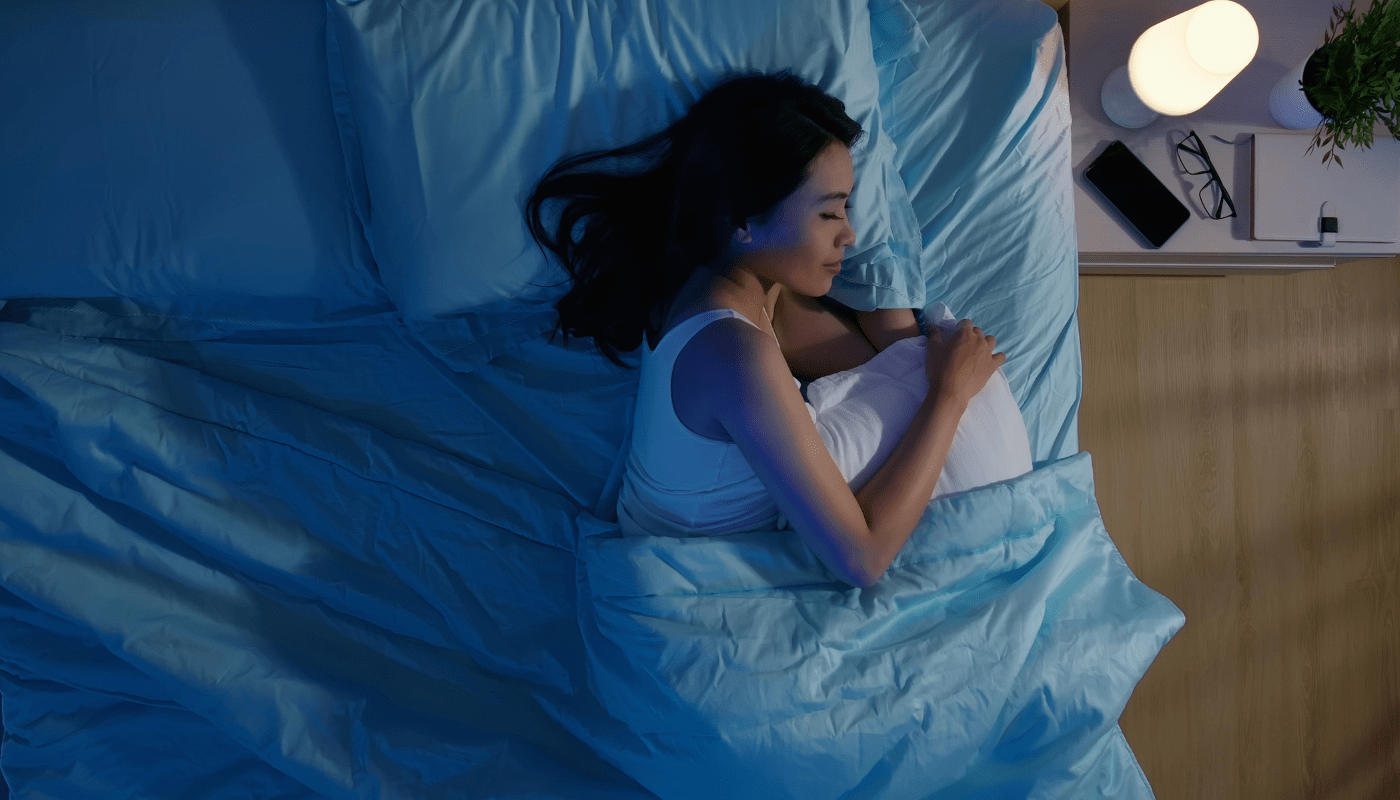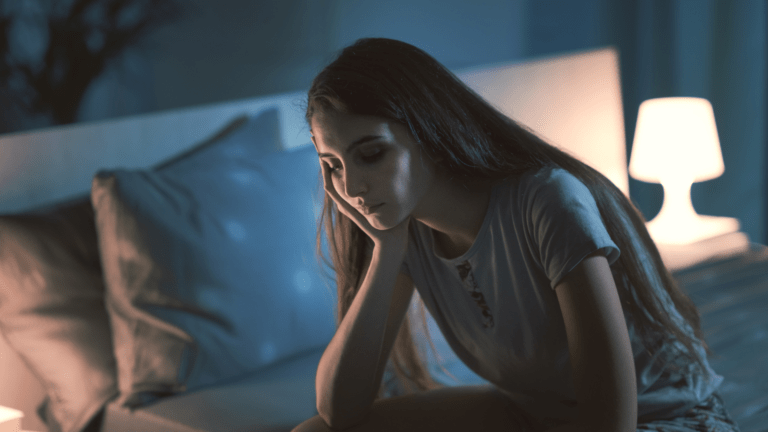You might think that falling asleep fast is impossible if you don’t naturally drift off as soon as your head hits the pillow. But that’s a myth! Learning how to fall asleep fast can be achieved by anyone with the right approach. Let’s dive into why sleep is so important and what you can do to improve your sleep quality.
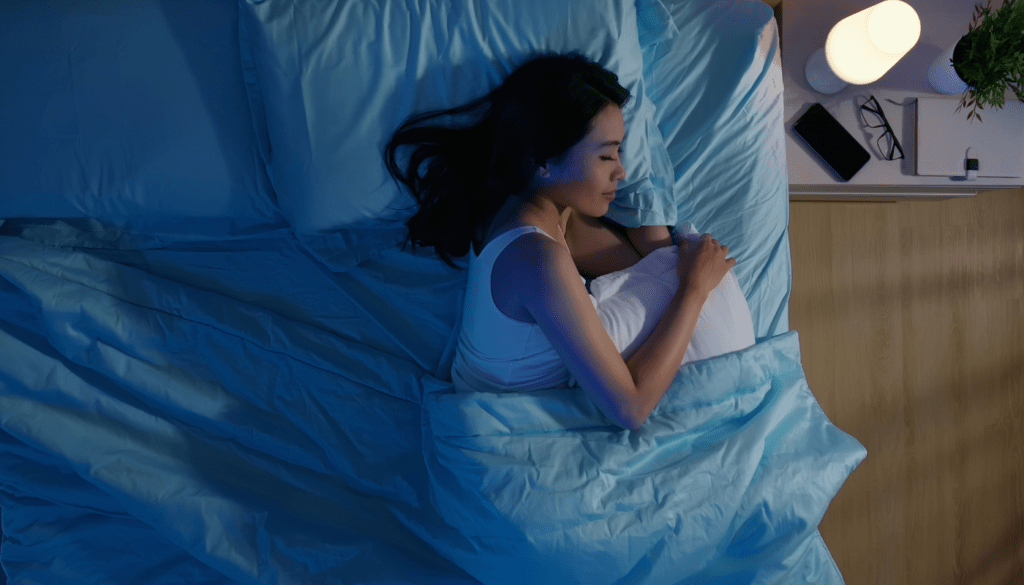
Why Can’t You Sleep?
Ever find yourself lying awake at night, staring at the ceiling, wondering why you just can’t fall asleep? You’re not alone. Many people struggle with sleepless nights, and it’s a frustrating experience. But the good news is that there are simple, effective ways to change this. The key is understanding what’s keeping you awake and making a few changes to your habits and environment.
If you’re asking, “How can I sleep quickly?” or “How do I fall asleep faster?”, the answer often lies in creating a consistent sleep routine. Establishing regular sleep and wake times helps regulate your body’s internal clock. For those wondering “How do I go to sleep quickly?” or “How do you fall asleep quicker?”, consider implementing a relaxing pre-sleep routine such as reading or taking a warm bath.
Importance of Good Sleep
Getting a good night’s sleep isn’t just about feeling rested. Quality sleep is crucial for your overall health and well-being. It boosts your mood, sharpens your brain, and even strengthens your immune system. Poor sleep, on the other hand, can lead to a range of problems like anxiety, depression, and a weakened immune response. So, if you’re tossing and turning every night, it’s time to take action to find the fastest way to fall asleep and improve your sleep quality, ensuring you get a good night’s rest.
What to Expect
In this blog, we’re going to explore practical, science-backed tips to help you fall asleep fast. We’ll cover everything from setting up your bedroom for sleep success to the best pre-sleep rituals. By the end, you’ll have a toolkit of strategies to improve your sleep and finally get the rest you deserve.
How Sleep Works
To fix your sleep problems, you first need to understand how sleep works. Sleep happens in cycles, each lasting about 90 minutes. There are two main types of sleep: REM (Rapid Eye Movement) and non-REM sleep. Non-REM sleep includes three stages, progressing from light sleep to deep sleep. REM sleep is when you dream. Each type of sleep is essential for different aspects of brain function and physical health.
Your body cycles through these stages several times each night. Disruptions in this cycle can lead to poor sleep quality and make it harder to fall asleep in the first place. Knowing this helps you understand why certain habits can affect your sleep so profoundly. If you’ve ever wondered, “How to go to sleep fast” or “How can I fall asleep faster?” understanding and maintaining these sleep cycles is a key factor in improving your overall sleep quality.
Common Sleep Disorders and How to Fall Asleep Faster
Sometimes, the reason you can’t sleep fast is due to an underlying sleep disorder. Here are a few common ones:
Insomnia
This is when you have trouble falling asleep or staying asleep. It can be short-term or chronic. Insomnia can be caused by stress, anxiety, or irregular sleep schedules. Treatment often includes lifestyle changes, cognitive-behavioral therapy, and, in some cases, medication.
Sleep Apnea
This is a condition where your breathing stops and starts during sleep, leading to frequent awakenings. Sleep apnea can result in loud snoring and daytime fatigue. Treatment options include lifestyle changes, continuous positive airway pressure (CPAP) therapy, or surgery in severe cases.
Restless Leg Syndrome (RLS)
This is an uncontrollable urge to move your legs, usually because of uncomfortable sensations. RLS symptoms often worsen in the evening or night, disrupting sleep. Treatment may involve lifestyle changes, iron supplements, or medications to manage the symptoms.
If you suspect you have a sleep disorder, it’s important to talk to a healthcare professional. They can provide a diagnosis and recommend treatment options.
By understanding sleep and recognizing potential sleep disorders, you’re already on your way to improving your sleep habits. Stay tuned for the next sections where we’ll dive into creating the perfect sleep environment and establishing a sleep routine that works for you.
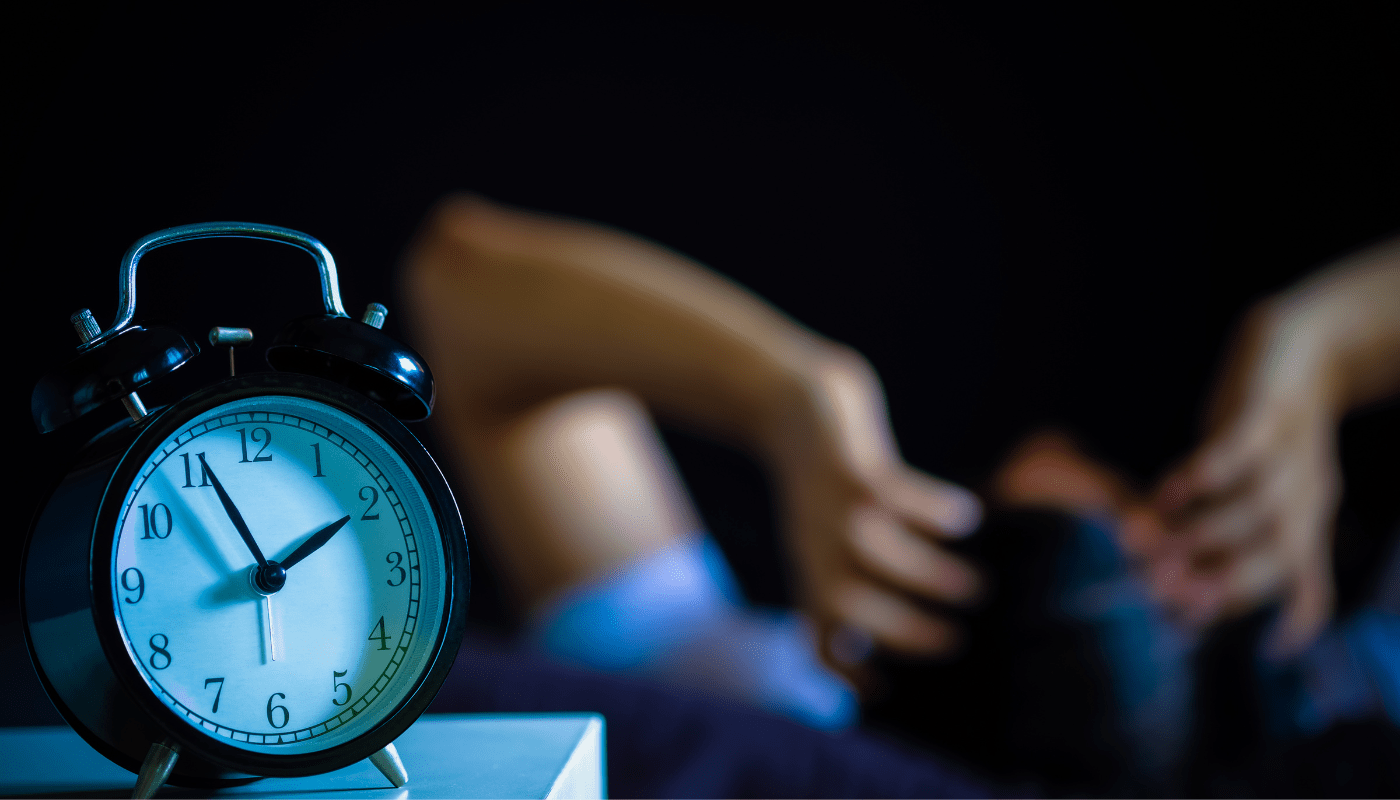
Creating the Perfect Sleep Environment
Contrary to popular belief, falling asleep fast isn’t just about lying down and closing your eyes. Your environment plays a huge role in how quickly you can drift off. Let’s explore how to set up your space for the best sleep possible.
In addition to optimizing your environment, incorporating meditation and vitamins into your routine can further enhance your sleep quality. Meditation helps calm your mind, while vitamins like magnesium support relaxation, helping you achieve core sleep.
Optimal Bedroom Setup
Your bedroom should be a sleep sanctuary. Here’s how to set it up:
Comfortable Mattress and Pillows
A good mattress and supportive pillows are essential. If you’re waking up with aches and pains, it might be time to invest in new bedding. Look for a mattress that suits your sleeping style, whether you’re a side sleeper, back sleeper, or stomach sleeper.
Minimal Clutter
A clutter-free bedroom can promote relaxation. Keep your space tidy and remove any unnecessary items that might distract you. Clutter can create a feeling of chaos, making it harder to unwind. Organize your bedroom to create a serene environment conducive to restful sleep.
Importance of Darkness and Quiet
Light and noise can significantly disrupt your sleep. Here’s what you can do:
Dark Room
Light exposure can interfere with your body’s production of melatonin, a hormone that regulates sleep. Use blackout curtains or an eye mask to keep your room dark. Avoid bright screens and artificial lights close to bedtime to help maintain a natural sleep cycle.
Quiet Environment
Noise can wake you up or prevent you from falling asleep. Consider using earplugs or a white noise machine to drown out background sounds. Creating a consistent and soothing auditory environment can help reduce disruptions and improve sleep quality.
Ideal Room Temperature
Temperature is another crucial factor:
Cool Temperature
The ideal room temperature for sleep is between 60-67°F (15-19°C). Your body temperature naturally drops during sleep, so a cooler room can help you fall asleep faster. Additionally, a comfortable mattress and breathable bedding can enhance the cooling effect and support a restful night’s sleep.
Establishing a Sleep Routine
One of the biggest misconceptions is that you can go to bed at any time and still fall asleep quickly. In reality, a consistent routine is key to training your body to fall asleep fast.
Consistent Sleep Schedule
Going to bed and waking up at the same time every day helps regulate your body’s internal clock. This means even on weekends or days off, try to stick to your schedule. Over time, your body will know when it’s time to sleep and wake up, making it easier to fall asleep fast.
Pre-Sleep Rituals
Creating a relaxing bedtime routine signals to your body that it’s time to wind down. Here are some ideas:
Reading
Pick up a book (but avoid thrilling genres) to help relax your mind. Choose light, non-stimulating material that allows your brain to transition smoothly from the day’s activities to sleep. Reading in a dim, comfortable light can also reduce eye strain before bed.
Warm Bath
Taking a warm bath can help relax your muscles and lower your body temperature, which signals to your body that it’s time to sleep. Incorporate calming essential oils like lavender for added relaxation. Aim for a bath about an hour before bed to give your body time to cool down.
Light Stretching
Gentle stretching can relieve muscle tension and help you relax. Focus on stretches that ease stress and promote calmness, such as deep breathing exercises. Incorporating light stretching into your pre-sleep routine can improve circulation and prepare your body for restful sleep.
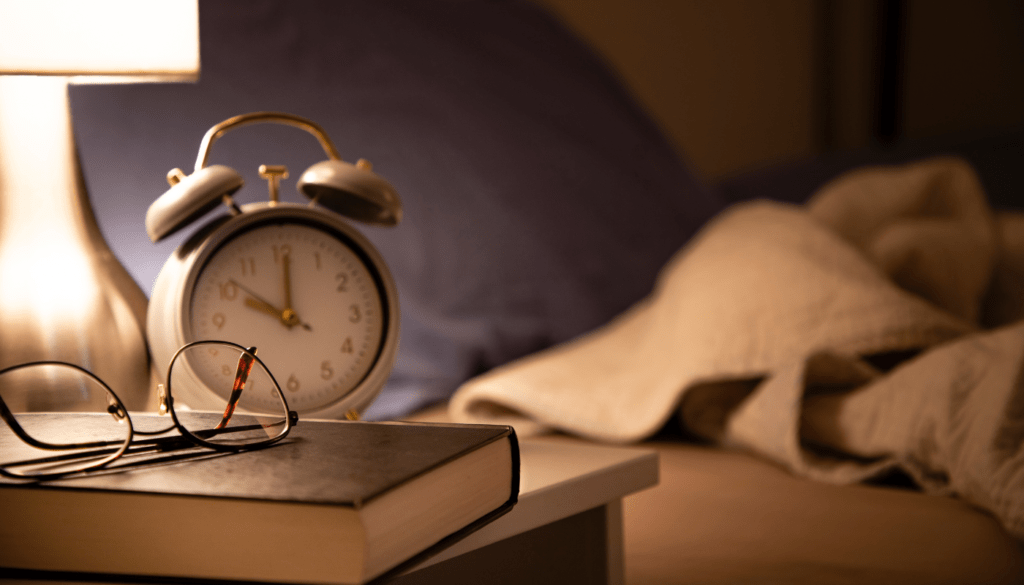
Limiting Screen Time
Screens emit blue light, which can interfere with melatonin production. Here’s how to manage your screen time:
No Screens Before Bed
Try to avoid screens at least an hour before bed. This includes TVs, smartphones, and computers. Engaging in non-digital activities like reading a book or practicing relaxation techniques can help prepare your mind for sleep. Create a tech-free zone in your bedroom to reinforce a restful environment.
Night Mode
If you must use your devices, switch them to night mode, which reduces blue light emission. Additionally, consider using blue light-blocking glasses to further minimize light interference. These adjustments can help maintain your body’s natural sleep rhythm and improve overall sleep quality.
Creating the perfect sleep environment and establishing a consistent routine are fundamental steps toward falling asleep fast. By making these changes, you’ll create conditions that make it easier for your body to relax and drift off into a peaceful slumber.
Diet and Lifestyle Tips for Better Sleep
You might think what you eat and your daily habits don’t affect how fast you fall asleep, but that’s a misconception. Your diet and lifestyle play significant roles in your sleep quality and how quickly you can drift off.
Foods that Help You Sleep
What you eat can either help you sleep or keep you awake. Here are some foods that promote sleep:
Bananas
Rich in magnesium and potassium, which help relax muscles. They also contain tryptophan, an amino acid that supports melatonin production. Eating a banana before bed can contribute to a more restful night’s sleep by easing muscle tension and improving overall sleep quality.
Almonds
Contains magnesium, a mineral that can improve sleep quality. Almonds also provide a good source of protein and healthy fats, which can help maintain stable blood sugar levels throughout the night. Snacking on a small handful of almonds in the evening can support a more sustained and restful sleep.
Chamomile Tea
Known for its calming effects, it can help you relax before bed. Chamomile contains apigenin, an antioxidant that binds to specific receptors in the brain to induce sleepiness. Drinking a cup of chamomile tea an hour before bedtime can create a soothing pre-sleep ritual and improve sleep onset.
Kiwi
High in antioxidants and serotonin, which can improve sleep onset and duration. Kiwi also provides vitamins C and E, which support overall health and contribute to better sleep. Consuming kiwi before bed can enhance your sleep quality by supporting both the onset and maintenance of sleep throughout the night.
Including these sleep-inducing foods in your diet can help you fall asleep faster and stay asleep longer.
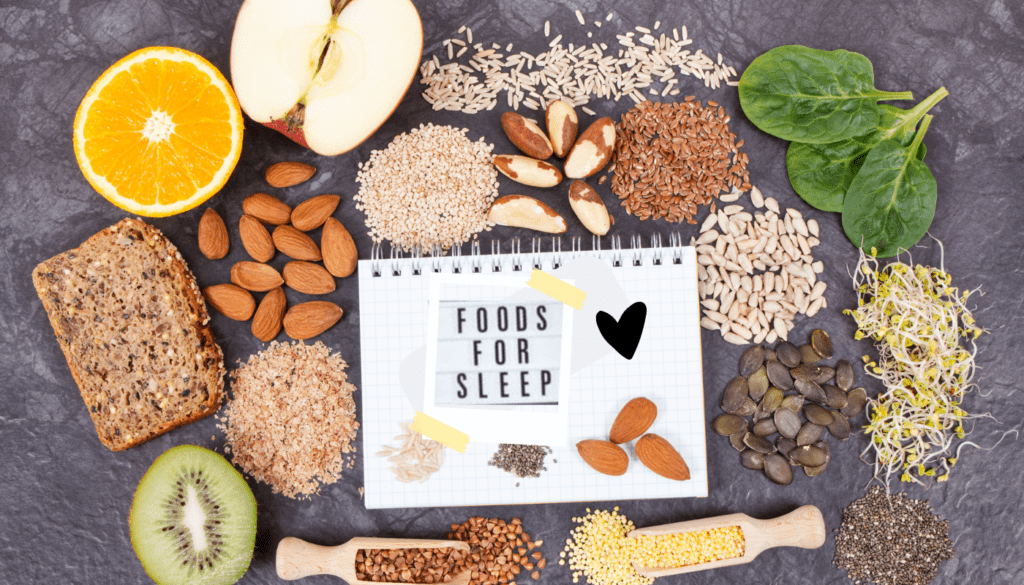
Avoiding Stimulants
Certain foods and drinks can keep you up at night. Here’s what to avoid:
Caffeine
Found in coffee, tea, chocolate, and some medications, caffeine can stay in your system for up to 8 hours. Avoid it in the afternoon and evening. Consuming caffeine late in the day can delay sleep onset and reduce overall sleep quality. Opt for caffeine-free alternatives in the hours leading up to bedtime to promote a more restful night.
Nicotine
A stimulant that can interfere with sleep. If you smoke, try not to do so close to bedtime. Nicotine can increase heart rate and alertness, making it harder to fall asleep. Reducing nicotine consumption or quitting smoking altogether can improve sleep quality and overall health.
Alcohol
While it might make you feel sleepy initially, alcohol can disrupt your sleep cycle and lead to poor-quality sleep. It can interfere with REM sleep and cause frequent awakenings throughout the night. Limiting alcohol intake, especially in the evening, can help maintain a more consistent and restorative sleep pattern.
By cutting out these stimulants, especially in the hours leading up to bedtime, you’ll give your body a better chance to relax and fall asleep naturally.
Physical Activity and Sleep
Exercise is another crucial factor in falling asleep fast:
Regular Exercise
Engaging in regular physical activity can help you fall asleep faster and enjoy deeper sleep. Aim for at least 30 minutes of moderate exercise most days of the week. Exercise increases your body’s core temperature and promotes the release of endorphins, which can improve sleep quality. However, ensure your exercise routine is consistent to see long-term benefits.
Timing
While exercise is beneficial, try not to do it too close to bedtime. Working out in the morning or early afternoon is best. Exercising too late in the evening can elevate your heart rate and body temperature, making it harder to wind down before bed. Allowing a few hours between your workout and bedtime helps your body return to a restful state more easily.
By incorporating regular exercise into your routine, you’ll improve your overall health and make it easier for your body to wind down at night.
Techniques to Fall Asleep Fast
If you’ve tried everything and still struggle to fall asleep quickly, these techniques might be just what you need. They can help calm your mind and prepare your body for sleep.
Relaxation Techniques
Relaxation techniques can be incredibly effective for falling asleep faster. Here are a few to try:
Deep Breathing
Focus on your breathing to help your body relax. Try inhaling deeply through your nose, holding for a few seconds, and then exhaling slowly through your mouth. This practice can lower your heart rate and reduce stress, preparing your body for restful sleep. Incorporate deep breathing exercises into your pre-sleep routine to calm your nervous system.
Progressive Muscle Relaxation
Tense and then slowly relax each muscle group, starting from your toes and working your way up to your head. This technique helps release physical tension and promote relaxation. By focusing on each muscle group individually, you can ease the stress that may be keeping you awake.
Meditation
Practicing mindfulness meditation can help quiet your mind and reduce stress. Find a quiet space, sit comfortably, and focus on your breath or a calming mantra. Regular meditation can improve sleep quality by helping you manage anxiety and stay present, making it easier to fall asleep and stay asleep.
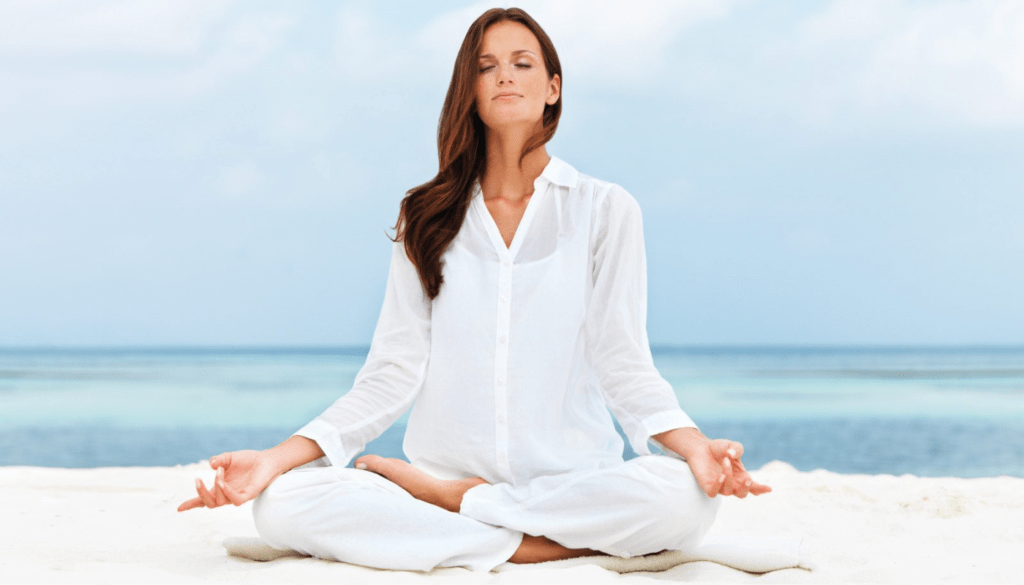
The 4-7-8 Breathing Method
This simple yet powerful technique can help you relax and fall asleep quickly:
How to Do It
Inhale through your nose for 4 seconds, hold your breath for 7 seconds, and exhale through your mouth for 8 seconds. Repeat this cycle 3-4 times before bed. This method helps lower your heart rate and relax your muscles, making it easier to drift into sleep.
Benefits
This method helps calm your nervous system and prepares your body for sleep. By focusing on your breath and extending your exhalation, you encourage a state of relaxation and reduce feelings of anxiety, which can improve your overall sleep quality.
Visualization and Guided Imagery
Using your imagination can also help you fall asleep:
Visualization
Picture a peaceful scene, like a beach or a forest, and focus on the details to distract your mind from worries. Engaging all your senses in the visualization can enhance its effectiveness and create a mental escape from stress, leading to a more restful sleep.
Guided Imagery
Listen to a guided meditation or sleep story that takes you through a relaxing journey. These audio guides often include calming narratives and soothing sounds that can help ease your mind and transition you smoothly into sleep, improving the quality of your rest.
By incorporating these techniques into your bedtime routine, you can create a sense of calm that makes it easier to fall asleep fast.
With the right diet, lifestyle habits, and relaxation techniques, you can significantly improve your ability to fall asleep quickly. These changes might take some time to become effective, but with consistency, you’ll start to see improvements in your sleep quality. Stay tuned for the next sections, where we’ll discuss when to seek professional help and summarize the key points of this blog.
When to Seek Professional Help
Many people believe that they can solve all sleep problems on their own. While lifestyle changes and home remedies can significantly improve sleep, there are times when you need to seek professional help.
Recognizing Chronic Sleep Problems
If you’ve tried everything and still can’t fall asleep fast, you might be dealing with a chronic sleep issue. Here are some signs that you need professional help:
Persistent Insomnia
If you’ve had trouble falling or staying asleep for more than a few weeks, it’s time to talk to a doctor. Chronic insomnia can be a symptom of underlying health issues that need to be addressed. A healthcare professional can help diagnose the cause and suggest appropriate treatments.
Daytime Fatigue
Constant tiredness during the day, even after a full night’s sleep, can indicate a sleep disorder. This fatigue can affect your ability to concentrate, reduce productivity, and increase the risk of accidents. It’s crucial to identify and treat the root cause to improve your daily functioning.
Mood Changes
Sleep problems can lead to anxiety, depression, or irritability. If you notice significant mood changes, seek help. Poor sleep can exacerbate mental health issues, and addressing your sleep problems can lead to better emotional stability and overall well-being.
Recognizing these symptoms is crucial. Chronic sleep problems can affect your overall health, so don’t hesitate to reach out to a healthcare provider.
Treatments for Sleep Disorders
If you’re diagnosed with a sleep disorder, there are various treatments available:
Cognitive Behavioral Therapy for Insomnia (CBT-I)
This therapy helps you change thoughts and behaviors that negatively impact your sleep. CBT-I can include techniques like sleep restriction, stimulus control, and relaxation training. It’s considered a highly effective, long-term solution for chronic insomnia.
Medications
In some cases, doctors may prescribe sleep aids or other medications to help you sleep better. These can include short-term prescriptions for benzodiazepines or non-benzodiazepine sedatives, as well as medications targeting underlying issues like anxiety or depression.
Sleep Studies
If a sleep disorder like sleep apnea is suspected, you might need to undergo a sleep study to determine the best treatment. A sleep study, or polysomnography, monitors your sleep cycles and identifies disruptions, helping healthcare providers develop a targeted treatment plan.
By seeking professional help, you can get a tailored treatment plan that addresses your specific sleep issues.
Conclusion
Falling asleep fast might seem like a dream, but with the right strategies, it can become a reality. Let’s recap the tips and encourage you to take action.
Here’s a quick summary of the key points we’ve covered:
Now that you know how to fall asleep fast, it’s time to put these tips into practice. Start by making small changes and gradually build up to a full sleep routine. Remember, consistency is key.
If you find that these tips aren’t enough, don’t hesitate to seek professional help. There’s no shame in reaching out for support, and it can make a world of difference in your sleep quality.
We’d love to hear from you! Share your experiences with these tips in the comments below. What worked for you? Do you have any additional tips to share? Your feedback can help others struggling with sleep issues.
Don’t forget to share this blog with friends and family who might benefit from these sleep tips. Together, we can all enjoy better, more restful nights.
By following these steps and maintaining a proactive approach to your sleep health, you’ll be well on your way to falling asleep fast and waking up refreshed. Sweet dreams!
